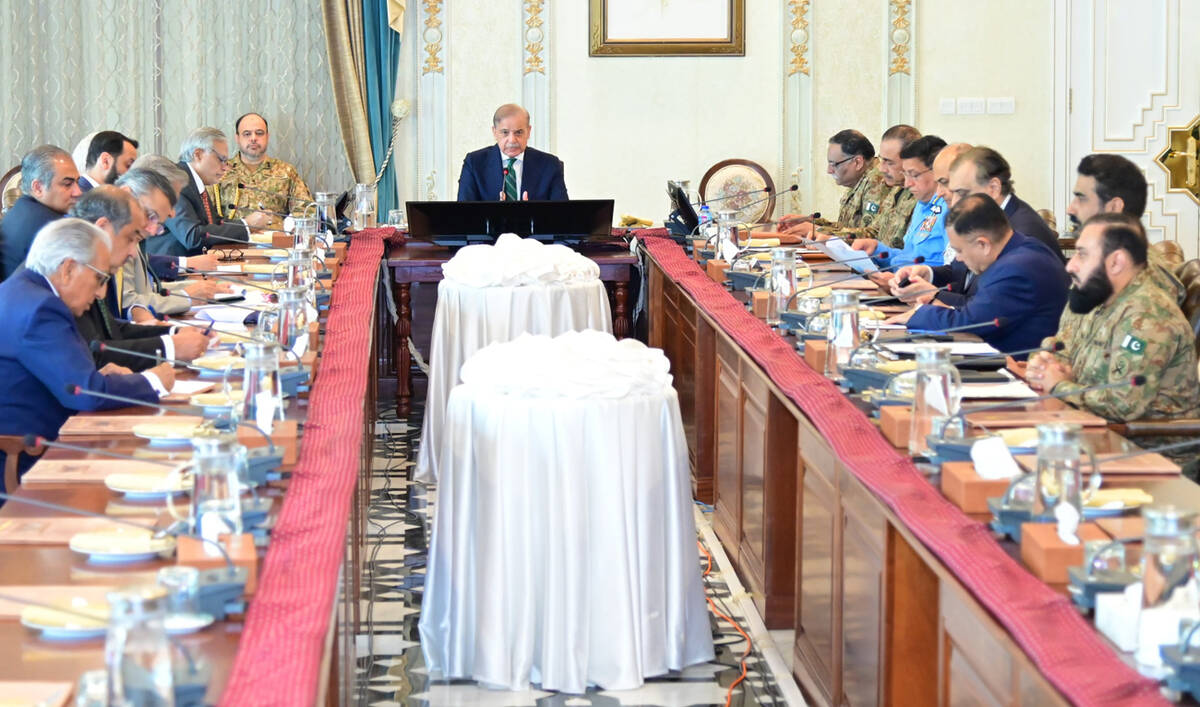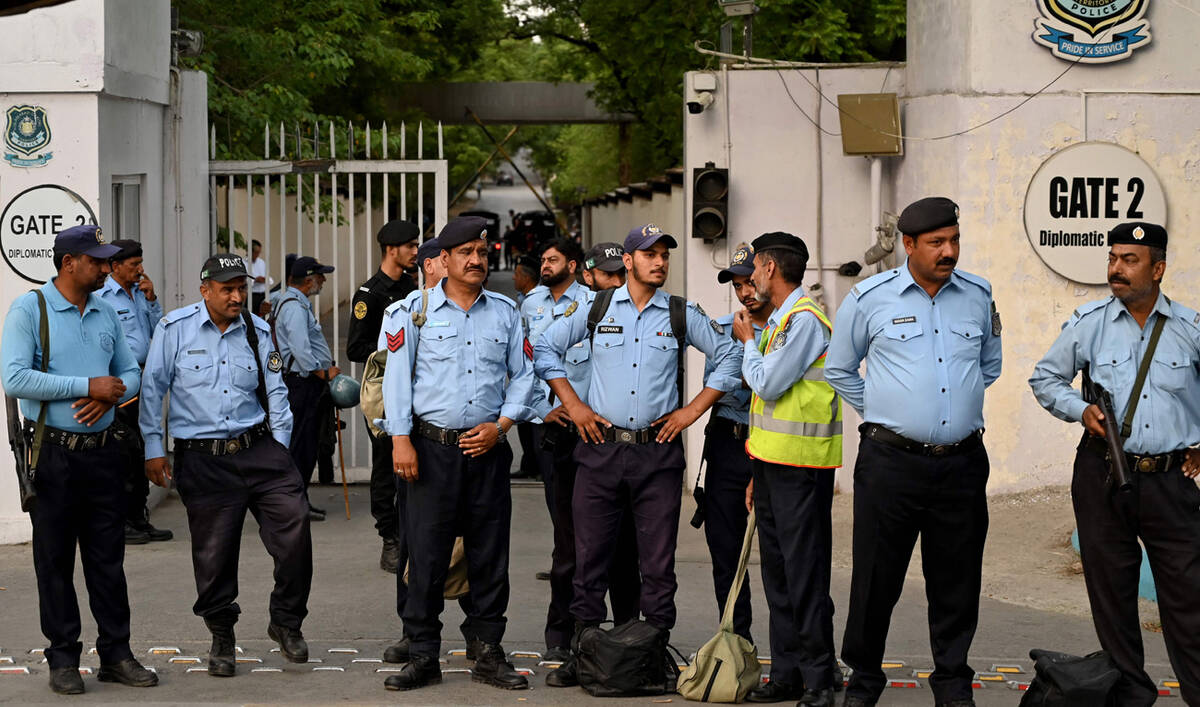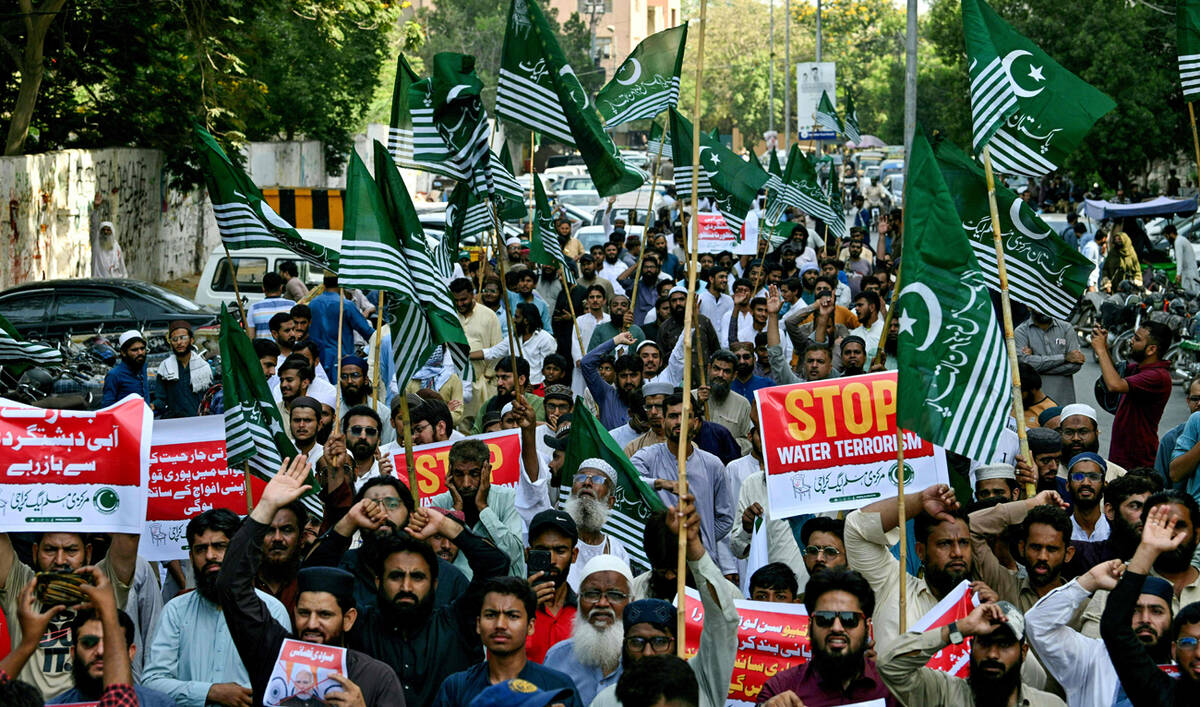PESHAWAR: At least two policemen were killed on Friday when a convoy of local judges came under attack in northwestern Pakistan, a police official confirmed, as the country grapples with a surge in militant attacks, particularly in the restive Khyber Pakhtunkhwa (KP) province bordering Afghanistan.
Pakistan has faced deadly attacks by the banned militant conglomerate Tehreek-e-Taliban Pakistan (TTP) since an uneasy truce between them collapsed in November 2022.
The network, whose leadership is reportedly based in neighboring Afghanistan, has targeted civilians and security forces with impunity since its inception in 2007, prompting the military to launch multiple operations to dislodge its fighters from the country’s northwestern tribal region.
This is not the first time the lives of district judges have been endangered by militants operating in KP. Last April, Judge Shakirullah Marwat was abducted by unidentified kidnappers near a village at the junction of Tank and Dera Ismail (DI) Khan districts but was recovered after a few days.
“Two policemen have been killed who were part of the judges’ security squad,” District Police Officer Abdul Salam Khalid told Arab News on Friday. “The attack on the convoy occurred at the junction of Tank and DI Khan.”
The police official said two judges were traveling in separate cars from Dera Ismail Khan to South Waziristan when their convoy was ambushed by unidentified militants. He added more details related to the incident would be shared after the investigation was completed.
Meanwhile, Regional Police Officer Nasir Mehmood said the attack was not aimed at the judges but was instead carried out to target the police personnel.
“Attacks on police and law enforcement agencies occur on and off in the region,” he added.
Reacting to the attack, KP Chief Minister Ali Amin Gandapur described the targeting of judges and police as a “sad and condemnable” act, directing the authorities to submit a detailed report on the incident.
The province has witnessed a major increase in militant violence, with two policemen and a civilian killed this week in an attack on a police checkpoint in Khyber district.
Earlier in July, 10 soldiers and five civilians lost their lives in two separate attacks in the Bannu and Dera Ismail Khan districts of KP.
In the first attack, the army reported that a group of 10 militants attempted to enter the cantonment in Bannu in the early hours of July 15, while in the second attack, militants opened fire on rural health center staff.
In February, 10 policemen were killed and six others injured in an attack on the Chodwan police station in Dera Ismail Khan, a district that remains one of the most dangerous parts of KP due to frequent militant attacks.
Pakistan has blamed the recent surge in militant violence on the Taliban administration in Afghanistan, which it says facilitates groups like the TTP. Kabul denies allowing its territory to be used by armed militants and maintains that Pakistan’s security issues are a domestic matter.
Two policemen killed as judges’ convoy attacked by militants in northwestern Pakistan
https://arab.news/bmrqf
Two policemen killed as judges’ convoy attacked by militants in northwestern Pakistan

- Both judges remain safe in the shooting incident at a junction between Tank and Dera Ismail Khan
- A senior police official in the area says the militants primarily wanted to target the police personnel
Families heartbroken as Pakistan closes airspace for Indian planes, land border shut

- Militant attack in Indian-administered Kashmir has triggered diplomatic crisis between Islamabad and New Delhi
- Diplomatic relations between Pakistan and India were weak even before the latest measures were announced
KARACHI: A 79-year-old Pakistani man, Ali Hasan Baqai, lamented about not being able to meet his siblings living in India as he sat with his wife and grandchildren at his house in Pakistan’s Karachi, hours after Pakistan closed its air space for Indian airlines on Thursday.
The move came in retaliation to a raft of actions by India after a deadly militant attack on tourists in Indian-administered Kashmir that New Delhi says Pakistan is involved in. Pakistani officials have rejected the accusations.
The latest diplomatic crisis was triggered by the killing of 26 men at a popular tourist destination in Indian-administered Kashmir on Tuesday, in the worst attack on civilians since the 2008 Mumbai shootings. The tit-for-tat announcements took relations between the nuclear-armed neighbors, who have fought three wars, to the lowest level in years.
Whenever relations deteriorate between Pakistan and India, elderly Baqai is besieged with a feeling of longing for his siblings and his birthplace on the other side of the border with India.
“I was planning to visit India. My sisters there were also planning to travel to Pakistan. But all of a sudden this attack happened. We could not even think of it. The situation was absolutely normal but suddenly the situation turned bad,” Baqai told Reuters Television.
Ali was born in 1946 in Delhi, India, a year before the partition of the subcontinent in 1947. He was last able to visit Delhi in 2014. Two of his sisters, along with his mother, passed away in the subsequent years. His three brothers died in India last year.
“If we don’t get a chance and the borders are closed for a long time, the only way left is we go to Dubai and meet each other there,” he said.
“You can’t meet your relatives. We can neither go there, nor can they come. It has become a mockery now. There is no hope left.”
Roadside blast kills three paramilitary troops in Pakistan’s volatile southwest

- The blast appeared to target bomb disposal personnel of the Frontier Corps paramilitary force in the Marget coalfield
- No group immediately claimed responsibility for the attack but suspicion is likely to fall on Baloch separatist militants
QUETTA: A roadside blast killed three paramilitary troops and injured four others in Pakistan’s southwestern Balochistan province on Friday, a local administration official said.
The blast in Margat area, home to coal mines and located some 60 kilometers from the provincial capital of Quetta, appeared to target the Frontier Corps paramilitary force’s bomb disposal personnel when they were clearing the route.
Balochistan, which shares a porous border with Iran and Afghanistan, has been the site of a decades-long insurgency by Baloch separatists who have targeted security forces protecting mining fields, laborers and truckers transporting minerals.
“An improvised explosive device (IED) was planted along the route being used for the transportation of coal from the Marget coalfield which exploded when the bomb disposal wing of the Frontier Corps was busy in security clearance of the route,” Quetta Deputy Commissioner Saad bin Asad told Arab News.
“Three soldiers of the BD wing were killed and four wounded in the attack.”
No group immediately claimed responsibility for the attack, but suspicion is likely to fall on ethnic Baloch separatist militants, who frequently target security forces, Chinese nationals, ethnic Punjabi commuters and laborers in the restive province.
The separatists accuse Islamabad of exploiting the province’s natural resources, such as gold and copper. Successive Pakistani governments have denied the allegations and said they only worked for the uplift of the region and its people.
The latest attack comes a day after three people, including two women, were killed when a vehicle was hit by a powerful explosion in Balochistan’s Kalat district. Last month, the Baloch Liberation Army separatist group hijacked a train with hundreds of passengers aboard near Balochistan’s Bolan Pass, which resulted in the deaths of 23 soldiers, three railway employees and five passengers. At least 33 insurgents were also killed.
Pakistan accuses the neighboring Afghanistan and India of supporting separatist militants in Balochistan, an allegation denied by New Delhi and Kabul.
Pakistan, Afghanistan agree to enhance trade and connectivity in push to reset ties

- Ties with Kabul have been strained over a spike in militancy and a deportation drive against Afghan nations
- Pakistani deputy PM and special envoy to Kabul visited Islamabad last week in an attempt to resolve issues
ISLAMABAD: Pakistan and Afghanistan have agreed to enhance trade and connectivity during a visit to Kabul by top officials from Islamabad, the foreign office said on Friday, amid a push by the two neighbors to reset soured relations.
Pakistan-Afghanistan relations have been strained by a spike in militancy in Pakistan’s western regions that border Afghanistan, following the Taliban’s takeover of Kabul in 2021. Islamabad says anti-Pakistan militants carry out cross-border attacks using safe havens in Afghanistan, a charge Kabul denies.
Another source of tension has been Pakistan’s decision to expel undocumented Afghans and those who had temporary permission to stay, saying it can no longer cope. Since November 2023 when Islamabad first launched the deportation drive against illegal foreigners, over 900,000 Afghans have left the country. The Afghan government has condemned the “unilateral measures” to forcibly deport tens of thousands of Afghans. Afghans have also reported weeks of arbitrary arrests, extortion and harassment by authorities as Islamabad has accelerated the deportation drive since April, a charge officials deny.
Amid these tensions, Pakistani Deputy Prime Minister Ishaq Dar and special envoy to Kabul, Ambassador Mohammad Sadiq, went to Afghanistan on a one-day visit last week widely seen as an attempt to resolve outstanding issues of contention.
“During the visit, the deputy prime minister [and] foreign minister held meetings with the acting Afghan prime minister, acting Afghan deputy prime minister and acting Afghan foreign minister,” Shafqat Ali Khan, a Pakistani foreign office spokesperson, told reporters at a weekly news briefing in Islamabad.
“Both sides held extensive discussions on a range of issues including peace and security, people-to-people contacts and agreed to enhance bilateral trade and economic cooperation to the mutual benefit of people of both countries.”
Pakistan remains at loggerheads with two of its main neighbors, India and Afghanistan, while Islamabad’s relations with Iran have also seen friction in recent weeks over the killing of eight Pakistani laborers in Iran’s Sistan-Baluchestan province. Both Pakistan and Iran last year exchanged strikes against what they called militant hideouts, but quickly moved to de-escalate tensions.
This week, an attack on tourists in India’s Himalayan territory of Kashmir has sparked a new crisis between nuclear armed neighbors India and Pakistan, with New Delhi blaming militants with “cross-border linkages” for the killings, which Islamabad denies. Both nations have announced tit-for-tat measures to downgrade ties in the aftermath of the violence.
The tensions have come as Pakistan navigates a tricky path to economic recovery, seeking to boost trade by enhancing connectivity with regional countries and attract foreign investment from allies in the region and beyond.
In this regard, Dar on Thursday held a telephonic conversation with Uzbekistan Foreign Minister Seyedov Bakhtiar Odilovic and apprised him of his discussions with Afghan officials about a tri-nation railway line project involving Uzbekistan, Pakistan and Afghanistan.
“The deputy prime minister shared his discussions in Kabul regarding Uzbekistan-Afghanistan-Pakistan railway line project and hoped that the three countries would soon sign the framework agreement for this important regional connectivity project,” the foreign office spokesman said at the briefing.
The project is part of Pakistan’s efforts to position itself as a key trade and transit hub, connecting the landlocked Central Asian states to the global market.
‘Out of the question’ Pakistan’s Nadeem will attend Bengaluru meet, Indian javelin hero Chopra says

- Chopra had earlier announced world’s top throwers, including Olympian Nadeem, had been invited to first Neeraj Chopra Classic on May 24
- Tuesday’s attack in Kashmir prompted heavy criticism of Chopra’s decision to invite Nadeem even though he was unlikely to attend
NEW DELHI: India’s Olympic javelin gold medalist Neeraj Chopra said it was now “completely out of the question” that rival Arshad Nadeem of Pakistan will attend his meet in Bengaluru next month following Tuesday’s deadly militant attack in Indian-administered Kashmir.
Relations between nuclear-armed neighbors India and Pakistan have plummeted to their lowest level in years after the killing of 26 tourists on Wednesday.
A day before the attack, Chopra had announced that the world’s top throwers, including Paris Olympics champion Nadeem, had been invited to the first Neeraj Chopra Classic on May 24, an event he hoped would pave the way for a Diamond League meet in India one day.
However, the attack in Kashmir prompted heavy criticism of Chopra’s decision to invite Nadeem, even though it was unlikely the Pakistan thrower was going to attend.
“There has been so much talk about my decision to invite Arshad Nadeem to compete in the Neeraj Chopra Classic, and most of it has been hate and abuse,” Chopra, who won gold in Tokyo and silver in Paris, said in a social media post on Friday.
“The invitation I extended to Arshad was from one athlete to another — nothing more, nothing less. The aim of the NC Classic was to bring the best athletes to India and for our country to be the home of world-class sporting events.
“After all that has taken place over the last 48 hours, Arshad’s presence at the NC Classic was completely out of the question.”
Media reports said Nadeem, Pakistan’s first individual Olympic gold medalist, had opted not to attend the Bengaluru meet, which clashed with his training schedule for the Asian Championships in South Korea next month.
The soured relations between the two countries also spilled over to the sports world earlier this year when India’s cricket team refused to travel to Pakistan for the Champions Trophy and played all their matches, including the March 9 final, in Dubai.
Islamabad says army ‘fully prepared’ as Indian and Pakistani troops exchange fire in Kashmir

- India accuses Pakistan of involvement after attack in Indian-administered Kashmir, Islamabad calls charges “devoid of rationality”
- There is growing concern since Tuesday’s attack that India could conduct military strikes in Pakistani territory as it did in 2019
ISLAMABAD: Pakistani Foreign Office Spokesman Shafqat Ali Khan said on Thursday the country’s armed forces were “fully prepared” to defend its sovereignty as troops from Pakistan and India exchanged fire overnight across the Line of Control in disputed Kashmir.
Relations have plunged to their lowest level in years, with India accusing Pakistan of supporting “cross-border terrorism” after gunmen carried out the worst attack on civilians in Indian-administered Kashmir for a quarter of a century. Pakistan has rejected India’s accusations as being “devoid of rationality,” saying they were made without any “credible investigation” or “verifiable evidence.”
Both nations have since announced tit-for-tat measures, including closing the only open land border they share, and suspending special South Asian visas that enabled people to travel between them. They have declared each other’s defense advisers in missions in New Delhi and Islamabad persona non grata and reduced the strength of their embassies.
India has also suspended a critical treaty that regulated the sharing of water from the Indus River and its tributaries, with Pakistan warning that any attempt to stop or divert its water would be considered an act of war and met with “full force.” Pakistan has paused all bilateral agreements, suspended all trade with India, including to and from any third country and closed its airspace to all Indian-owned and Indian-operated airlines.

“The National Security Committee underscored that Pakistan, its armed forces, remain fully capable and prepared to defend its sovereignty and territorial integrity against any misadventure,” the foreign office spokesman told a weekly news briefing, referring to Thursday’s meeting of top Pakistani military and civilian officials to finalize Islamabad’s response to India’s accusations and escalatory actions.
“The Pakistani nation remains committed to peace, but will never allow anyone to transgress its sovereignty, security, dignity and their inalienable rights.”

There is growing concern since Tuesday’s attack that India could conduct a military strike in Pakistani territory as it did in 2019 in retaliation for a suicide bombing in Pulwama in Indian-administered Kashmir in which at least 40 Indian paramilitary police were killed. Pakistan had denied official complicity in that assault. Several leaders of Prime Minister Narendra Modi’s Hindu nationalist Bharatiya Janata Party have also variously called for military action against Pakistan this week.
Speaking to an international media outlet on Thursday evening, Pakistani Defense Minister Khawaja Muhammad Asif said Islamabad would respond “in kind and with full force” to any Indian incursion on the pretext of Tuesday’s militant attack.

Meanwhile, Syed Ashfaq Gilani, a government official in Pakistan-administered Kashmir known as Azad Kashmir, told AFP Friday that troops exchanged fire along the Line of Control (LOC), which runs 742km (460 miles), dividing Indian- and Pakistan-controlled Kashmir, and acts as part of the de facto border between the two countries. The military frontline, which runs through inhospitable terrain, has separated hundreds of families and even divided villages and mountains.
“There was no firing on the civilian population,” Gilani added.
India’s army confirmed there had been limited firing of small arms that it said had been “initiated by Pakistan,” adding it had been “effectively responded to.”

India’s army chief is expected to review security arrangements on Friday and visit the site in the Pahalgam area of Tuesday’s attack, Reuters reported on Friday, quoting army sources.
The two countries both claim Muslim-majority Kashmir in full but rule it in part. India, a Hindu majority nation, has long accused Muslim-majority Pakistan of aiding separatists who have battled security forces in its part of the territory — accusations Islamabad denies.














